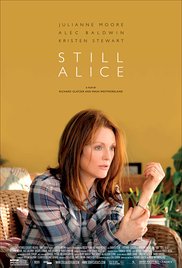 A friend of mine in his seventies was diagnosed with Alzheimer’s several years ago. At first it was indicated by minor forgetfulness; but over time, the symptoms became more severe. His wife confessed to me after a couple of years that her husband was no longer the person he once was. He barely recognized her or the rest of his family. Indeed it was a sad and disturbing reality that the family confronted.
A friend of mine in his seventies was diagnosed with Alzheimer’s several years ago. At first it was indicated by minor forgetfulness; but over time, the symptoms became more severe. His wife confessed to me after a couple of years that her husband was no longer the person he once was. He barely recognized her or the rest of his family. Indeed it was a sad and disturbing reality that the family confronted.
This mental decline is the subject of Still Alice, the unsettling narrative of Alice Howland, a top-flight professor of Linguistics at Columbia University, who discovers she has early onset Alzheimer’s when she is 50 years old.
At first we observe her forgetting little things, sometimes losing her train of thought while speaking. Later she loses her sense of direction and gets lost after an afternoon run. When she goes to a neurologist for help with her memory problems, the doctor, after giving Alice a number of tests, concludes that she has early onset Alzheimer’s Disease.
Although she is loved by her husband and children, both have difficulty dealing with the reality of a wife and mother whose memory is deteriorating each day. There is no cure. The crisis in the family brings some of its members closer together, but it is a strain. At the end of the day, they must accept a difficult and painful reality.
Although Still Alice is about how one woman deals with a terrible disease that takes away memory, the film indirectly informs us how important memories are. Near the beginning of her mental decline, Alice gives a powerful speech to an Alzheimer’s support group, which captures the dissonance between who she is now with who she once was: “All my life I’ve accumulated memories – they’ve become, in a way, my most precious possessions. The night I met my husband, the first time I held my textbook in my hands. Having children, making friends, traveling the world. Everything I accumulated in life, everything I’ve worked so hard for – now all that is being ripped away. But it gets worse. Who can take us seriously when we are so far from who we once were? Our strange behavior and fumbled sentences change other’s perception of us and our perception of ourselves. We become ridiculous, incapable, comic. My greatest wish is that my children, our children – the next generation – do not have to face what I am facing. But for the time being, I’m still alive. I know I’m alive. I have people I love dearly. I still have moments in the day of pure happiness and joy. And please do not think that I am suffering. I am not suffering. I am struggling. Struggling to be part of things, to stay connected to whom I was once.”
In the English class I teach, we recently discussed how biographies are different from autobiographies. The key difference is that the author of the autobiography relies heavily on memory to write his life’s story. I shared with my students the background behind my first book, The One of Us, which recounted my year in Israel as a student over thirty years ago. I was able to write about it only because I saved all the letters (aerograms, in those days) that I wrote and that my mother sent me, and they jogged my memory about events that took place during that year. Memory allowed me to re-experience the past and make it meaningful in the present.
Judaism values memory. Each year Jews experience a cycle of holy days that remind us to focus on past memories in order to appreciate and understand the present, and to navigate the future. Remembering the past is what makes us who we are today. Without memory, we are adrift spiritually and socially. Memory connects us to our history and to each other. Shared memories are an expression of our human connections which transcend time and space. Still Alice reminds us to treasure our memories and the human connections that matter along our life’s journey.
This was very meaningful for me. (I read the book and saw the movie.) I feel strongly about the fact that movies can enhance our lives. And I feel even stronger that memory is central to our religious/Jewish/human lives.
Thanks for sharing.
Moore was great and felt as if she definitely deserved that Oscar. Nice review.